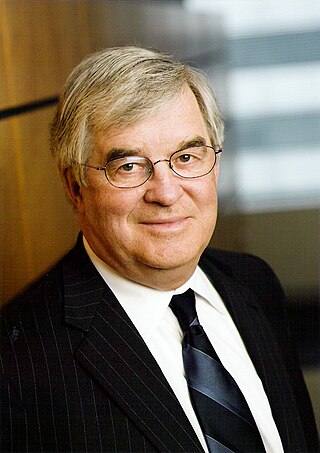The Glass–Steagall legislation describes four provisions of the United States Banking Act of 1933 separating commercial and investment banking. The article 1933 Banking Act describes the entire law, including the legislative history of the provisions covered.

Robert Foster Bennett was an American politician and businessman who served as a United States Senator from Utah from 1993 to 2011. A member of the Republican Party, Bennett held chairmanships and senior positions on various key Senate committees, including the Banking, Housing and Urban Affairs Committee; Appropriations Committee; Rules and Administration Committee; Energy and Natural Resources Committee; and Joint Economic Committee.

Douglas Kent Bereuter is an American retired politician from the state of Nebraska in the Midwestern United States. He served in the United States House of Representatives from 1979 until 2004. He also served as the president and CEO of The Asia Foundation from 2004 to 2011 and is a member of the ReFormers Caucus at Issue One. Bereuter is a member of the Republican Party.

The United States Senate Committee on Banking, Housing, and Urban Affairs, also known as the Senate Banking Committee, has jurisdiction over matters related to banks and banking, price controls, deposit insurance, export promotion and controls, federal monetary policy, financial aid to commerce and industry, issuance of redemption of notes, currency and coinage, public and private housing, urban development, mass transit and government contracts.

The United States House Committee on Financial Services, also referred to as the House Banking Committee and previously known as the Committee on Banking and Currency, is the committee of the United States House of Representatives that oversees the entire financial services industry, including the securities, insurance, banking and housing industries. The Financial Services Committee also oversees the work of the Federal Reserve, the United States Department of the Treasury, the U.S. Securities and Exchange Commission and other financial services regulators.

Mark Walter Olson was an American economist and bank executive who served as a member of the Federal Reserve Board of Governors from 2001 to 2006. Filling an unexpired term to end on January 31, 2010, he resigned on June 21, 2006, in order to run the Public Company Accounting Oversight Board.

The Securities and Exchange Commission of Pakistan (SECP) is the financial regulatory agency in Pakistan whose objective is to develop a modern and efficient corporate sector and a capital market based on sound authority principles, in order to encourage investment and foster economic growth and prosperity in Pakistan.
Bradley Belt is an American businessman. He is the CEO of Palisades Capital and the managing director of the Milken Institute. He is vice chairman of Orchard Global Asset Management.
The Senate Banking Subcommittee on Financial Institutions and Consumer Protection is one of five subcommittees within the Senate Committee on Banking, Housing, and Urban Affairs.
The Senate Banking Subcommittee on Housing, Transportation, and Community Development is one of five subcommittees within the Senate Committee on Banking, Housing, and Urban Affairs.
The Senate Banking Subcommittee on Economic Policy is one of five subcommittees within the Senate Committee on Banking, Housing, and Urban Affairs.
The Senate Banking Subcommittee on National Security and International Trade and Finance is one of five subcommittees within the Senate Committee on Banking, Housing, and Urban Affairs.
The U.S. House Financial Services Subcommittee on Capital Markets is a subcommittee of the House Committee on Financial Services. It was previously known as the Subcommittee on Investor Protection, Entrepreneurship and Capital Markets.

Kathleen L. Casey is a former Republican commissioner of the U.S. Securities and Exchange Commission. She was appointed by President George W. Bush and sworn in on July 17, 2006. Her term expired in August 2011.

Mark Anthony Calabria was the Director of the Federal Housing Finance Agency (FHFA). He was formerly the chief economist for Vice President Mike Pence. President Biden removed him from the FHFA on June 23, 2021, following the Supreme Court decision in Collins v. Yellen.

The Business Risk Mitigation and Price Stabilization Act of 2013 is a bill that passed the United States House of Representatives during the 113th United States Congress. The bill would exempt nonfinancial entities that enter into a swap or a security-based swap transaction from meeting certain margin requirements when the transaction is designed to offset losses or gains in other investments.
The Glass–Steagall Act was a part of the 1933 Banking Act. It placed restrictions on activities that commercial banks and investment banks could do. It effectively separated those activities, so the two types of business could not mix, in order to protect consumer's money from speculative use. The Banking Act of 1935 clarified and otherwise amended Glass–Steagall.
The Glass–Steagall legislation was enacted by the United States Congress in 1933 as part of the 1933 Banking Act, amended as part of the 1935 Banking Act, and most of it was repealed in 1999 by the Gramm–Leach–Bliley Act (GLBA). Its protections and restrictions had also been chipped away during most of its existence by lenient regulatory interpretations and use of loopholes. After Glass–Steagall's 1999 repeal, there was a great deal of discussion in the banking and securities industries, and among policymakers and economists, about the practical positive and negative changes to the business and consumer environment. Later, as financial crises and other issues played out in the United States and even worldwide, arguments have broken out about whether Glass–Steagall, as originally intended, would have prevented these issues.

Richard Bookstaber is the author of A Demon Of Our Own Design, a book highlighting the fragility of the financial system that occurs from tight coupling and complexity. The book is noted for its foreshadowing of the financial crisis of 2007–08. He is also the author of The End of Theory, which critiques the applicability of economics in dealing with financial crises, and proposes an alternative paradigm using agent-based models.

Securities market participants in the United States include corporations and governments issuing securities, persons and corporations buying and selling a security, the broker-dealers and exchanges which facilitate such trading, banks which safe keep assets, and regulators who monitor the markets' activities. Investors buy and sell through broker-dealers and have their assets retained by either their executing broker-dealer, a custodian bank or a prime broker. These transactions take place in the environment of equity and equity options exchanges, regulated by the U.S. Securities and Exchange Commission (SEC), or derivative exchanges, regulated by the Commodity Futures Trading Commission (CFTC). For transactions involving stocks and bonds, transfer agents assure that the ownership in each transaction is properly assigned to and held on behalf of each investor.